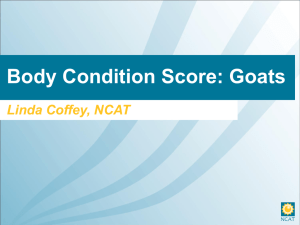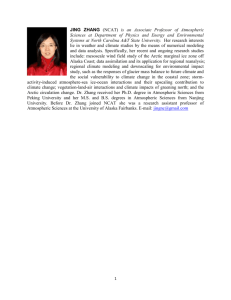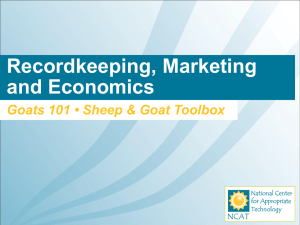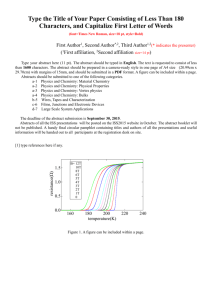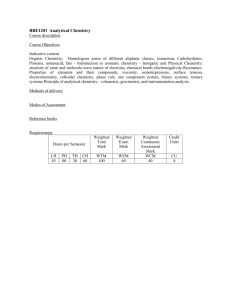EES 885- Special Topics - North Carolina Agricultural and Technical
advertisement
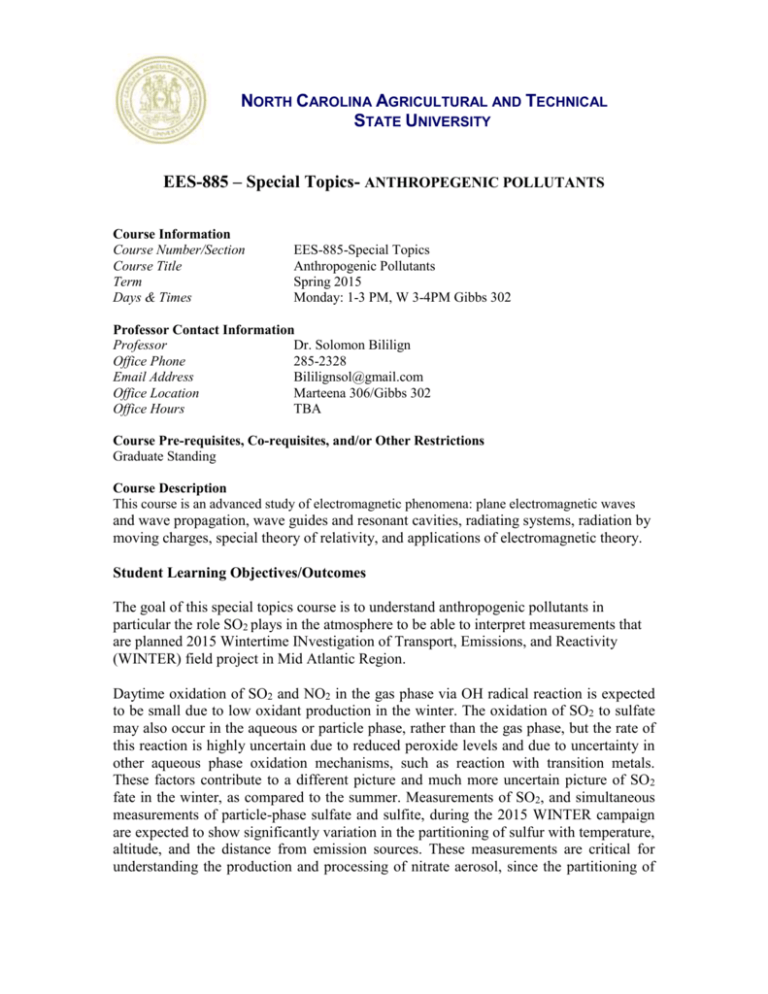
NORTH CAROLINA AGRICULTURAL AND TECHNICAL STATE UNIVERSITY EES-885 – Special Topics- ANTHROPEGENIC POLLUTANTS Course Information Course Number/Section Course Title Term Days & Times EES-885-Special Topics Anthropogenic Pollutants Spring 2015 Monday: 1-3 PM, W 3-4PM Gibbs 302 Professor Contact Information Professor Dr. Solomon Bililign Office Phone 285-2328 Email Address Bililignsol@gmail.com Office Location Marteena 306/Gibbs 302 Office Hours TBA Course Pre-requisites, Co-requisites, and/or Other Restrictions Graduate Standing Course Description This course is an advanced study of electromagnetic phenomena: plane electromagnetic waves and wave propagation, wave guides and resonant cavities, radiating systems, radiation by moving charges, special theory of relativity, and applications of electromagnetic theory. Student Learning Objectives/Outcomes The goal of this special topics course is to understand anthropogenic pollutants in particular the role SO2 plays in the atmosphere to be able to interpret measurements that are planned 2015 Wintertime INvestigation of Transport, Emissions, and Reactivity (WINTER) field project in Mid Atlantic Region. Daytime oxidation of SO2 and NO2 in the gas phase via OH radical reaction is expected to be small due to low oxidant production in the winter. The oxidation of SO2 to sulfate may also occur in the aqueous or particle phase, rather than the gas phase, but the rate of this reaction is highly uncertain due to reduced peroxide levels and due to uncertainty in other aqueous phase oxidation mechanisms, such as reaction with transition metals. These factors contribute to a different picture and much more uncertain picture of SO2 fate in the winter, as compared to the summer. Measurements of SO2, and simultaneous measurements of particle-phase sulfate and sulfite, during the 2015 WINTER campaign are expected to show significantly variation in the partitioning of sulfur with temperature, altitude, and the distance from emission sources. These measurements are critical for understanding the production and processing of nitrate aerosol, since the partitioning of 2 HNO3 is strongly pH dependant and the build-up of nitrate can suppress N2O5 reactive uptake. Observations of SO2 will answer questions of interest include: 1) What role does SO2 and its oxidation products play in the reactive uptake of N2O5 into aerosols? How sensitive is this effect to changes in temperature, abundance of gas- and particle-phase species, water content, acidity, and particle size? 2) Do global models over predict SO2 and under predict particle sulfate due to inadequate resolution and/or dynamics or from an incomplete knowledge of chemical mechanisms and aerosol thermodynamics during the winter? The course involves (1) Several weeks of lectures and discussions using standard textbooks to cover the topics listed below. (2) Literature review where selected papers relevant to the field project will be discussed (3) Analyze a the data and write a paper on SO2 measurements during WINTER Outcome:- At the conclusion of the course a student the students will have clear Understanding SO2 chemistry in the atmosphere, filed measurement techniques, data analysis, literature review and paper writing skills Required Textbooks and Materials Required Texts Chemistry of the Upper and Lower Atmosphere, Pitts and Pitts ATMOSPHERIC CHEMISTRY AND PHYSICS- Seinfeld and Pandis Introduction to Atmospheric Chemistry- Jacob’s Required Materials N/A Suggested Course Materials Several published papers, review articles, EPA and NOAA reports will be used for this course Course Outline Topic # 1 Topic Overview of the Chemistry of Polluted and Remote Atmospheres, Atmospheric Trace Constituents 2 Photochemistry of Important Atmospheric Species Chemistry of the Troposphere Course Syllabus Source Chapter 1 Chemistry of the Upper and Lower Atmosphere-FPitts & Pitts Chapter 2:1-2:6 ATMOSPHERIC CHEMISTRY AND PHYSICS- Seinfeld and Pandis Chapter 4 Chemistry of the Upper and Lower Atmosphere-FP&P Page 2 3 Chapter 6:1-6 &13ATMOSPHERIC CHEMISTRY AND PHYSICS- Seinfeld and Pandis 3 Kinetics and Atmospheric Chemistry 4 Acid Deposition Formation and Fates of Inorganic and Organic Acids in the Troposphere Wet Deposition 5 Indoor Air Pollution Sources, Levels, Chemistry, and Fates Chapter 5 Chemistry of the Upper and Lower Atmosphere-FP&P Chapter 8 Chemistry of the Upper and Lower Atmosphere-FP&P Chapter 20: ATMOSPHERIC CHEMISTRY AND PHYSICS- Seinfeld and Pandis Chapter 13- Intro to Atmospheric ChemistryJacob’s Chapter 15- Chemistry of the Upper and Lower Atmosphere-FP&P Grading Policy Class participation, reviewing articles and summarizing content of published articles and writing reports, data analysis, and field experiments are involved in this curse Course Evaluation: - Literature review reports/ participation in discussions - 60% - Data Analysis and writing a draft of a paper-40% Course Policies Make-up exams N/A Extra Credit N/A Late Work Late work will not be accepted unless a valid reason for the late submission is presented. Course Syllabus Page 3 4 Special Assignments Class Attendance Students are expected to attend all class sessions and off-campus meetings that may be arranged with visiting scholars. Attendance and participation is vital to successful completion of the course. (Refer to The North Carolina Agricultural and Technical State University Bulletin on Class Attendance Policy, page 77). In case of excused absences, students have the responsibility to obtain the information and material covered on the session. Excuses will be granted according to NC.A&T SU student handbook. Moreover, the College of Arts and Sciences requires students to be on time for class and to attend class on a regular basis. If the student has unexcused absences, is late for class or leaves class early, the student’s grade may be lowered. (See attendance policy set forth by the instructor in the course syllabus.) Excused absences will comply with the following university policy on make-up work: “Sickness (verification needed); death of relative (immediate family); participation in an approved university related activity; acting in the capacity of a university representative (band, choir, sports, related travel, etc.); extraordinary circumstances including court appearances, family emergency~ at the discretion of the professor, etc. require a signed statement. NOTE: “Other reasons for class absences are not acceptable.” Classroom Citizenship Enrollment in the class means that you agree to abide by the expectations of North Carolina A&T State University about academic integrity. For specific information refer to your Student Handbook. Also, refer to the most current Undergraduate Bulletin for the academic dishonesty policy. The North Carolina A&T State University’s Academic Honor Code will be enforced. Your responsibilities in the area of honor include, but are not limited to, avoidance of cheating, plagiarism and improper or illegal use of technology. Your presentations, assignments, and quizzes are expected to be your own work. Any questions about these should be directed to the professor. It is permissible to request assistance from a librarian when doing database research as long as the selection and organization of the research for the presentation is in your own work. Technical Support If you experience any problems with your A&T account you may call Aggie Tech Support (formerly Help Desk) at 336.334.7195. Field Trip Policies / Off-Campus Instruction and Course Activities Student Affairs website http://www.ncat.edu/~staffair/; Student Handbook: http://www.ncat.edu/~deanofst/Handbook.htm; Student Travel Procedures and Student Travel Activity Waiver http://businessfinance.ncat.edu/policies%20and%20procedures%20index.htm Off-campus, out-of-state, and foreign instruction and activities are subject to state law and University policies and procedures regarding travel and risk-related activities. Information regarding these rules and regulations may be found at the website address: Student Travel Procedures and Student Travel Activity Waiver http://businessfinance.ncat.edu/policies%20and%20procedures%20index.htm. Course Syllabus Page 4 5 Additional information is available from the office of Student Affairs, please check the website at http://www.ncat.edu/~staffair/. Below is a description of any travel and/or risk-related activity associated with this course. Other Policies (e.g., copyright guidelines, confidentiality, etc.) Student Handbook: http://www.ncat.edu/~deanofst/Handbook.htm Family Educational Rights and Privacy Act http://www.ncat.edu/~registra/ferpa_info/index.htm Student Conduct & Discipline North Carolina A&T State University has rules and regulations that govern student conduct and discipline meant to ensure the orderly and efficient conduct of the educational enterprise. It is the responsibility of each student to be knowledgeable about these rules and regulations. Please consult the undergraduate http://www.ncat.edu/~acdaffrs/Bulletin_2008-2010/2008-2010_Undergraduate_Bulletin.pdf and graduate bulletins: 2008-2010 Graduate Catalog.doc http://www.ncat.edu/~gradsch/cstudents.html and student handbook http://www.ncat.edu/~deanofst/Handbook.htm for detailed information about specific policies such as academic dishonesty, cell phones, change of grade, disability services, disruptive behavior, general class attendance, grade appeal, incomplete grades, make up work, student grievance procedures, withdrawal, etc. These descriptions and timelines are subject to change at the discretion of the Professor. Course Syllabus Page 5

